2010 Kawasaki ZX-10R Review
Page 1 of 1
 2010 Kawasaki ZX-10R Review
2010 Kawasaki ZX-10R Review
Kawasaki’s
ZX-10R has always been one of the most lively and animalistic
literbikes of the bunch. These qualities define the big Ninja, for both
good and bad.
For the 2010 model year, Team Green has made a few subtle refinements
to the 10R, although its fundamental mechanical bits are unchanged.
The most distinguishable change is the adoption of new ZX-6R-inspired
bodywork that makes for a slimmer appearance. The ZX looks lighter,
even if its wet (fully fueled) weight of 459 pounds is unchanged since
it debuted as an all-new model in 2008.
Along with the new upper, center and side fairing panels, the big
Ninja’s overall look is also tweaked by an embossed metallic gray
coating on its titanium muffler that visually shrinks it in size to
minimize its awkward shape. Trim pieces around the fairing’s cockpit
area cleans up the rider’s eye view.
We’ve had no complaints about the 10R’s transmission since the 2008
iteration, but Kawi has changed shift ratchet assembly, shifting arm and
springs and collars to inhibit friction at the shift-shaft pivot.
Boring stuff to read about, but fans of smooth gearboxes will really
enjoy what is probably the slickest literbike tranny ever. A very
competent slipper clutch aids sloppy downshifts.
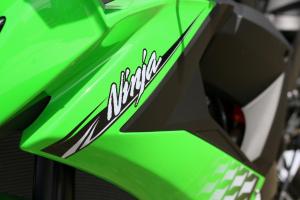 New
New
bodywork for 2010 looks especially good in its special-edition graphics.
One of the continued characteristics of the ZX-10R has been its
animalistic persona, and this latest version has the rumpity and
menacing idle that portends the ready availability of hyperspace mode.
EFI ensures it fires up cleanly and is quickly ready to ride away, but
the engine enters a growly, vibration-intensive region from 3000 to 4000
rpm followed by a wicked intake snarl that might make a timid rider
question his ability to control this missile once its fuse is lit.
But considering there are nearly 160 raging ponies at the back wheel,
the Ninja’s motor is actually quite manageable. Throttle response is
sharp but controllable, aided to some extent by KIMS (Kawasaki Ignition
Management System), an anti-wheelspin system that Kawi says “curtails
sudden spikes in engine speed” but isn’t comfortable describing it as
traction control. There is a slight abruptness dialing in throttle from
the closed position, feeling like engine vacuum is holding the
butterflies closed, but it’s easy enough to be smooth.
Other than the 3000-4000-rev vibe zone, the inline-Four has
negligible vibration. It’s amazingly smooth at freeway speeds, and
tingles are suppressed to such an extent that it would be possible to
zoom comfortably at 80 mph in fourth gear, verified by a handy
gear-position indicator. Impressive freeway roll-on grunt is available
without downshifting from sixth gear.
Despite the minimized bodywork, there is surprisingly good wind
protection, and it seems like the turnsignals in the mirror stalks
deflect wind from a rider’s hands. The 10R is entirely tolerable for an
hour while commuting to work or to the canyons, even for our tallest
(6-foot) test rider. We appreciate how the mirrors/signals and tailpiece
can be easily removed for track days, but both our shorter and taller
testers wished the mirrors had a broader range of adjustment.
The Ninja’s instrumentation is quite legible and comprehensive, but
we’d like to see a second tripmeter and a fuel gauge to augment the lap
timer, clock, and engine temp readouts. The gauges’ shift light is small
but readily visible.
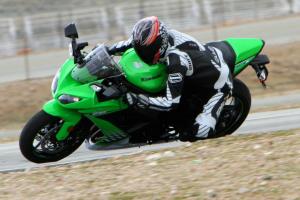 Pete
Pete
scything through the Streets of Willow on the updated Kawasaki ZX-10R.
It’s difficult to find places to unleash the massive power from the
10R on the street, and we found a similar experience even on a
racetrack. There are only a couple of places on the Streets of Willow
Springs where the ZX’s throttle cables could be fully stretched, and the
big Ninja never even gets out of third gear! And yet its chassis and
brakes are so good that it comported itself well in the tight confines
of the bumpy California track.
The ZX’s fuel tank cutouts provide good grip for knees when charging
hard, and I liked how my arms drape across the tank when hanging off,
supplying extra feedback.
“The combination of the fuel tank and frame spar shapes create a
genuine feeling of a light, narrow-waisted sportbike, almost like a
supersport,” Pete reports. “The sensation of a smaller, lighter
motorcycle could help a rider feel more confident with what is a very
powerful bike.”
Another tweak for 2010 is the addition of a new Öhlins steering
damper atop the upper triple clamp, distinguished by its titanium color
and laser-etched Öhlins logo. The previous generation ZX also had an
Öhlins damper, but it couldn’t be clamped down racer-tight. This new one
uses additional spring and oil pistons for stronger damping along its
18 clicks of adjustment.
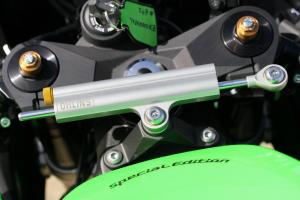 A new
A new
Ohlins steering damper offers increased damping for aggressive track
use.
As on the street, the DLC (Diamond-Like Coating) treated fork sliders
proved to be exceptionally compliant over smaller bumps, and the
suspension is responsive to adjustments. Braking power and modulation
remain excellent. Bridgestone BT016 tires warm quickly, grip well, and
provide neutral steering manners.
For 2010, the 1000cc Ninja is available in only two color choices.
The standard edition is painted in Metallic Spark Black and retails for
$12,999. An extra $200 will buy the Special Edition (Lime Green/Pearl
Stardust White) version of our test bike that also includes pinstriped
wheels – it drew many positive comments during our rides. It ships with a
green passenger seat; shown is the accessory seat cowl which costs
$119.95.
“After a year of not having ridden the ZX,” says Pete, “riding it was
almost like riding it for the first time. Experiencing its light
steering effort, light and snappy throttle response, communicative
chassis and rush of top-end acceleration was a thrill all over again!”
Indeed, the ZX-10R is an impressive machine, and the updates for the
2010 season only make it better.
Our 2009 Literbike Shootout narrowly ranked the ZX ahead of the
Suzuki GSX-R1000 and Yamaha YZF-R1, both of which are unchanged for
2010, so the Ninja's next challenge will be to take on the updated Honda
CBR1000RR and the potentially game-changing BMW S1000RR in our upcoming
inline-Four literbike comparo.
Has Japan Inc. done enough to stay ahead of the scintillating German
upstart? It’s sure to be a thrill finding out!
Related Reading:
2010
Literbike Shootout: Aprilia RSV4 Factory vs. Ducati 1198S vs. KTM RC8R
2010
Honda CBR1000RR C-ABS Review
2010
BMW S1000RR Review
2009
Literbike Shootout
2008
Literbike Shootout
2008
Kawasaki ZX-10R Review
ZX-10R has always been one of the most lively and animalistic
literbikes of the bunch. These qualities define the big Ninja, for both
good and bad.
For the 2010 model year, Team Green has made a few subtle refinements
to the 10R, although its fundamental mechanical bits are unchanged.
The most distinguishable change is the adoption of new ZX-6R-inspired
bodywork that makes for a slimmer appearance. The ZX looks lighter,
even if its wet (fully fueled) weight of 459 pounds is unchanged since
it debuted as an all-new model in 2008.
Along with the new upper, center and side fairing panels, the big
Ninja’s overall look is also tweaked by an embossed metallic gray
coating on its titanium muffler that visually shrinks it in size to
minimize its awkward shape. Trim pieces around the fairing’s cockpit
area cleans up the rider’s eye view.
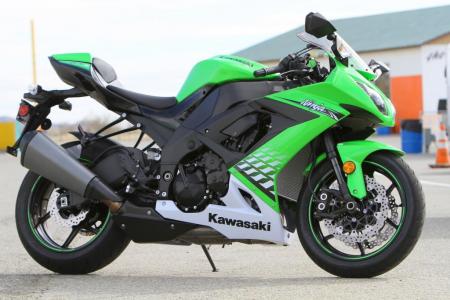 The The Kawasaki ZX-10R gets an updated appearance and subtle other tweaks for the 2010 model year. |
iteration, but Kawi has changed shift ratchet assembly, shifting arm and
springs and collars to inhibit friction at the shift-shaft pivot.
Boring stuff to read about, but fans of smooth gearboxes will really
enjoy what is probably the slickest literbike tranny ever. A very
competent slipper clutch aids sloppy downshifts.
 New
New bodywork for 2010 looks especially good in its special-edition graphics.
One of the continued characteristics of the ZX-10R has been its
animalistic persona, and this latest version has the rumpity and
menacing idle that portends the ready availability of hyperspace mode.
EFI ensures it fires up cleanly and is quickly ready to ride away, but
the engine enters a growly, vibration-intensive region from 3000 to 4000
rpm followed by a wicked intake snarl that might make a timid rider
question his ability to control this missile once its fuse is lit.
But considering there are nearly 160 raging ponies at the back wheel,
the Ninja’s motor is actually quite manageable. Throttle response is
sharp but controllable, aided to some extent by KIMS (Kawasaki Ignition
Management System), an anti-wheelspin system that Kawi says “curtails
sudden spikes in engine speed” but isn’t comfortable describing it as
traction control. There is a slight abruptness dialing in throttle from
the closed position, feeling like engine vacuum is holding the
butterflies closed, but it’s easy enough to be smooth.
Other than the 3000-4000-rev vibe zone, the inline-Four has
negligible vibration. It’s amazingly smooth at freeway speeds, and
tingles are suppressed to such an extent that it would be possible to
zoom comfortably at 80 mph in fourth gear, verified by a handy
gear-position indicator. Impressive freeway roll-on grunt is available
without downshifting from sixth gear.
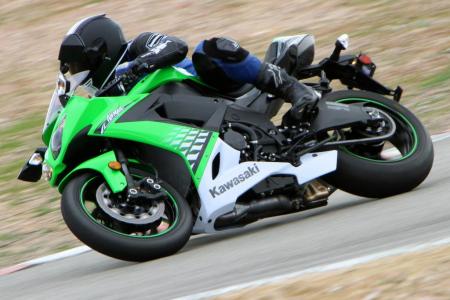 The 2010 The 2010 ZX-10R impressed us on public roads and on the Streets of Willow race course. |
protection, and it seems like the turnsignals in the mirror stalks
deflect wind from a rider’s hands. The 10R is entirely tolerable for an
hour while commuting to work or to the canyons, even for our tallest
(6-foot) test rider. We appreciate how the mirrors/signals and tailpiece
can be easily removed for track days, but both our shorter and taller
testers wished the mirrors had a broader range of adjustment.
The Ninja’s instrumentation is quite legible and comprehensive, but
we’d like to see a second tripmeter and a fuel gauge to augment the lap
timer, clock, and engine temp readouts. The gauges’ shift light is small
but readily visible.
 Pete
Pete scything through the Streets of Willow on the updated Kawasaki ZX-10R.
It’s difficult to find places to unleash the massive power from the
10R on the street, and we found a similar experience even on a
racetrack. There are only a couple of places on the Streets of Willow
Springs where the ZX’s throttle cables could be fully stretched, and the
big Ninja never even gets out of third gear! And yet its chassis and
brakes are so good that it comported itself well in the tight confines
of the bumpy California track.
The ZX’s fuel tank cutouts provide good grip for knees when charging
hard, and I liked how my arms drape across the tank when hanging off,
supplying extra feedback.
“The combination of the fuel tank and frame spar shapes create a
genuine feeling of a light, narrow-waisted sportbike, almost like a
supersport,” Pete reports. “The sensation of a smaller, lighter
motorcycle could help a rider feel more confident with what is a very
powerful bike.”
Another tweak for 2010 is the addition of a new Öhlins steering
damper atop the upper triple clamp, distinguished by its titanium color
and laser-etched Öhlins logo. The previous generation ZX also had an
Öhlins damper, but it couldn’t be clamped down racer-tight. This new one
uses additional spring and oil pistons for stronger damping along its
18 clicks of adjustment.
 A new
A new Ohlins steering damper offers increased damping for aggressive track
use.
As on the street, the DLC (Diamond-Like Coating) treated fork sliders
proved to be exceptionally compliant over smaller bumps, and the
suspension is responsive to adjustments. Braking power and modulation
remain excellent. Bridgestone BT016 tires warm quickly, grip well, and
provide neutral steering manners.
For 2010, the 1000cc Ninja is available in only two color choices.
The standard edition is painted in Metallic Spark Black and retails for
$12,999. An extra $200 will buy the Special Edition (Lime Green/Pearl
Stardust White) version of our test bike that also includes pinstriped
wheels – it drew many positive comments during our rides. It ships with a
green passenger seat; shown is the accessory seat cowl which costs
$119.95.
“After a year of not having ridden the ZX,” says Pete, “riding it was
almost like riding it for the first time. Experiencing its light
steering effort, light and snappy throttle response, communicative
chassis and rush of top-end acceleration was a thrill all over again!”
Indeed, the ZX-10R is an impressive machine, and the updates for the
2010 season only make it better.
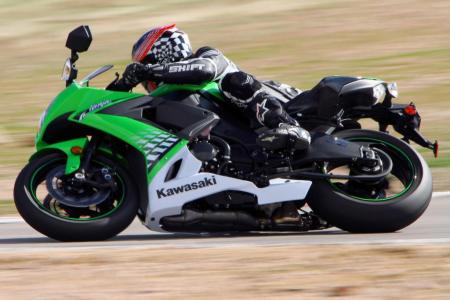 Pete leans Pete leansthe Special Edition ZX-10R into a right-hander. |
Suzuki GSX-R1000 and Yamaha YZF-R1, both of which are unchanged for
2010, so the Ninja's next challenge will be to take on the updated Honda
CBR1000RR and the potentially game-changing BMW S1000RR in our upcoming
inline-Four literbike comparo.
Has Japan Inc. done enough to stay ahead of the scintillating German
upstart? It’s sure to be a thrill finding out!
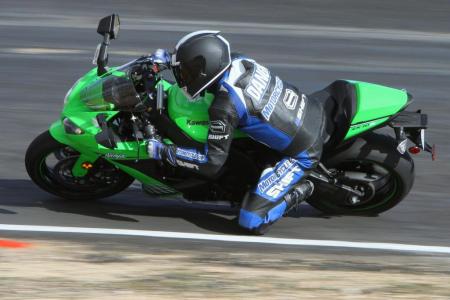 |
2010
Literbike Shootout: Aprilia RSV4 Factory vs. Ducati 1198S vs. KTM RC8R
2010
Honda CBR1000RR C-ABS Review
2010
BMW S1000RR Review
2009
Literbike Shootout
2008
Literbike Shootout
2008
Kawasaki ZX-10R Review
ganahsokmo- Join date : 16/01/2010
Age : 43
 Similar topics
Similar topics» 2010 Kawasaki Z1000 Review
» 2010 Kawasaki Concours 14 Review
» 2010 Kawasaki Versys Review
» 2010 Kawasaki KLX110 & KLX110L Review
» 2010 Kawasaki Ninja 650R Review
» 2010 Kawasaki Concours 14 Review
» 2010 Kawasaki Versys Review
» 2010 Kawasaki KLX110 & KLX110L Review
» 2010 Kawasaki Ninja 650R Review
Page 1 of 1
Permissions in this forum:
You cannot reply to topics in this forum


